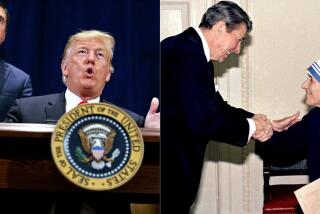Economic Witchcraft
- Share via
They called it voodoo economics back in 1980 when Candidate Reagan promised to balance the budget, raise defense spending and cut taxes. Well, he raised defense spending and cut taxes, all right. Some might argue that two out of three isn’t bad, except that we also got $200-billion-a-year budget deficits and a doubling of the national debt. But even now, six years later, it would seem that President Reagan still believes that witchcraft is a credible substitute for sound economic reasoning.
At his press conference on Tuesday, the President vowed to seek 3% real growth in defense spending in his 1987 budget, and to balance the budget over the next five years without raising taxes. It just cannot be done, even with the best magic potions and even if you ignore the provisions of the Gramm-Rudman deficit-cutting law, which the President seemed to do.
To make the President’s arithmetic work, Congress would have to disassemble the federal establishment down to the very basic programs of health, safety and law enforcement. The President knows that will not happen, and that his new budget will be effectively ignored when it arrives on Capitol Hill early in February.
Yet he still seems to insist that 2 + 2 = 5. For instance, he repeated his economic dogma that lower taxes bring in more federal revenues. Even with the big 1981 tax reductions, he said, “we’re getting the same percentage of gross national product in tax revenues at the lower rates that we’ve been getting before, and the answer to more revenues for government is economic growth.”
Wrong. Total federal receipts have declined as a percentage of gross national product since 1981, even counting the increase in Social Security taxes. The personal income tax has dropped from 9.9% in 1981 to 8.5% of GNP. The President, of course, still insists that the tax cut did not contribute to the deficit problem.
If Reagan were to get 3% real growth in defense next year, the military budget would have to increase by about $20 billion. But reality is that Gramm-Rudman, if it survives constitutional tests, would dictate an imprudent cut in defense spending of about $25 billion from current levels.
But it may be that the arithmetic of Gramm-Rudman finally is getting through to the White House. Reagan’s insistence on Tuesday that there be no tax increase during the next five years (although he will not be in office all that time) was not couched in quite the table-pounding rhetoric of recent weeks. And on Wednesday his spokesman said that while Reagan remains adamant against higher taxes, he would guarantee that there would not be any personal tax increases on the average American. One of the suggested sources of new revenue is an oil-import fee.
One of Reagan’s qualities that Americans seem to like is his buoyant optimism. But leadership also demands that leaders be candid with the people at times. Now is such a time. We hope that the President finally will become convinced of the need for additional revenue, and communicate that frankly to the people rather than to continue a game of economic charades.
More to Read
Get the L.A. Times Politics newsletter
Deeply reported insights into legislation, politics and policy from Sacramento, Washington and beyond. In your inbox three times per week.
You may occasionally receive promotional content from the Los Angeles Times.










